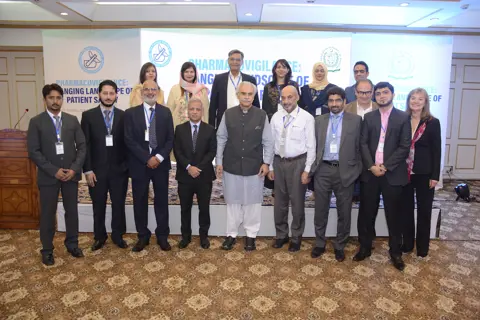
Abdul Mateen
Assistant Director, Pharmacy Services
Drug Regulatory Authority of Pakistan
Ministry of National Health Services Regulation and Coordination

Photo: iStock
In response to a tragic medication error, Pakistan continues to inject energy and momentum into its federal pharmacovigilance network.
For many years, Pakistan remained an associate member of the WHO Programme for International Drug Monitoring. However, with the establishment of the Drug Regulatory Authority of Pakistan (DRAP) in 2012, and subsequent establishment of the Pakistan National Pharmacovigilance Centre (PNPC), Pakistan achieved full membership of the programme.
Pakistan has a population of approximately 220 million, making it the world’s fifth most populous. It is a federation, comprised of four provinces, or federating units, and a federal capital. Pharmacovigilance activities in Pakistan were started in 1994 by the Ministry of Health and Public Welfare; however, a lack of human resources and infrastructure meant a vibrant national centre could not be established at the time, and the pharmacovigilance programme remained under the Ministry of Health until 2010.
A tragic incident in the Punjab Institute of Cardiology, Lahore in 2012 led to the deaths of more than 200 cardiac patients, due to accidental mixing of pyrimethamine with isosorbide mononitrate, resulting in severe folate deficiency, destruction of platelets in the bone marrow, and heavy internal bleeding in those patients.
In the aftermath of the incident, DRAP was established by the DRAP Act 2012, under supervision of the Ministry of National Health Services Regulations and Coordination. DRAP is responsible for the effective coordination and enforcement of the Drugs Act 1976; bringing harmony in inter- provincial trade and commerce of therapeutic goods; and regulating manufacture, import, export, storage, distribution, and sale of therapeutic goods. Its mission is to ensure access to safe, quality, and efficacious medicine at affordable prices and the earliest availability of new treatment opportunities for the people of Pakistan.
As per the DRAP Act, the Division of Pharmacy Services was given the mandate to monitor pharmacovigilance activities across the country. The division accordingly established the PNPC and started coordination with UMC. The PNPC also coordinated with market authorisation holders, public health programmes and provincial health departments for establishment of their pharmacovigilance centres and submission of reports.
In compliance with the federal framework, the Punjab government established a vibrant pharmacovigilance centre at provincial headquarters and market authorisation holders started submitting their pharmacovigilance data. As a regional centre of the PNPC, the data of the provincial pharmacovigilance centre of Punjab has now been integrated into the national database and the centre regularly publishes newsletters based on the post- marketing surveillance data and global safety updates.
More recently, in November 2019, the regional centre of Islamabad was also announced and began using Pakistan's VigiFlow database. The Islamabad pharmacovigilance centre has signed memorandums of understanding with potential private sector hospitals of the Islamabad region for promotion of pharmacovigilance activities.
With the endeavours of PNPC-DRAP, Pakistan became the 134th full member of the WHO programme in November 2018. The PNPC has developed procedures, guidelines, and online reporting forms for pharmacovigilance activities. In 2018, the PNPC conducted training for its officers, focal persons of provincial centres, and pharmacists of hospitals in Islamabad. In addition, the PNPC held a special training session for its officers on regulatory aspects of pharmacovigilance.

In October 2019, a one-day training session was organised in Islamabad, where international speakers were invited. The session was attended by more than 100 participants from DRAP, provinces, manufacturers, hospitals, and public health programmes. The PNPC also holds regular meetings with pharmacovigilance stakeholders, such as provincial health departments, public health programmes, and market authorisation holders. In 2019, the PNPC and DRAP collaborated on national observance of the first World Patient Safety Day.
Despite the PNPC’s progress, it still faces several challenges, including lack of awareness by healthcare professionals; reluctance to report; limited human resources and infrastructure, both at the national and provincial level; and a lack of will by public health programmes to participate in the pharmacovigilance programme.
The PNPC has developed comprehensive pharmacovigilance legislation and guidelines that will soon be announced to give a legal cover to the activities across Pakistan. It also has a plan to conduct an awareness campaign and training session for healthcare professionals to develop the reporting culture in the country. Further, the PNPC will train provincial pharmacovigilance centres on data collection, assessment, and data entry. In the long run, the PNPC plans to establish provincial pharmacovigilance centres in each province, and sub-regional centres will be established and integrated into Pakistan’s database.
All-in-all, although Pakistan’s pharmacovigilance system remains in its infancy, the steps taken by DRAP in the last five years demonstrate clear progress. The future of pharmacovigilance in Pakistan looks bright as new legislation and guidelines are introduced and more provincial and sub- provincial centres will be established across the country to monitor the safety of therapeutic goods and prevent harm to patients.
The annual #MedSafetyWeek campaign reminds us that medicines work best when they're safe. In Aligarh, healthcare workers came together to make that message a living reality.
19 November 2025
Since 2020, the ICPV has worked to improve drug safety reporting at Instituto Nacional de Cardiología Ignacio Chávez, with promising outcomes.
16 October 2025
Two-thirds of pharmacists in Nigeria witness weekly cough syrup abuse, yet poor reporting systems and unclear guidelines prevent effective intervention, leaving its youth at risk.
03 December 2025